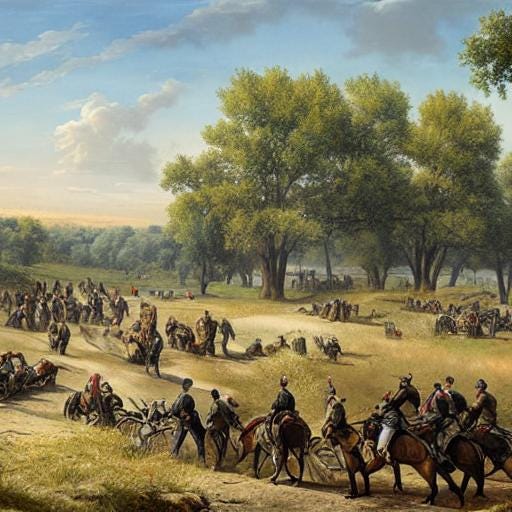The Night Visions anthologies were always worth collecting, in paperback. The Donald M. Grant hardcovers were hamstrung by poor design and unappealing cover and interior art. Still, invaluable time capsules of the horror field and in need of more emulation today.
"Iverson's Pits" (1988) by Dan Simmons is a superb novella, which I have written about here. Like Steve Duffy's novella "The Clay Party," it uses the horror genre to explore the Matter of North America with great skill and drama.
[1913 is the 50th anniversary of the Battle of Gettysburg. We follow a ten year old Philadelphia Boy Scout - our narrator - who along with thousands of other scouts is sent to the event to help escort veterans, forty thousand of whom attend.
[Our scout is assigned to Captain Montgomery of the 20th N.C. Reg., who is attending in hopes of coming to grips with his regiment's old commander, Colonel Alfred Iverson, Jr.]
“His first name was Alfred,” said the Captain. The old man’s voice was soft, preoccupied, and his southern accent was so thick that the meaning of each word reached me some seconds after the sound of it. It was a bit like lying in bed, already dreaming, and hearing the soft voices of my mother and father coming upstairs through a curtain of sleep. Or like magically understanding a foreign language. I closed my eyes to hear better. “Alfred,” said the Captain, “just like his daddy. His daddy’d been a Senator from Georgia, good friend of the President.” I could feel the old man’s gaze on me. “President Davis. It was Davis, back when he was a senator too, who give young Iverson his first commission. That was back durin’ the trouble with Mexico. Then when the real war come up, Iverson and his daddy got ’em up a regiment. Them days, when a rich goddamn family like the Iversons wanted to play soldiers, they just bought themselves a regiment. Bought the goddamn uniforms and horses and such. Then they got to be officers. Goddamn grown men playin’ at toy soldiers, Boy. Only once’t the real war begun, we was the toy soldiers, Johnny.”
I opened my eyes. I could not recall ever having seen so many stars. Above the slope of the meadow, constellations came all the way down to the horizon; others were visible between the dark masses of trees. The Milky Way crossed the sky like a bridge. Or like the pale tracks of an army long since passed by.
“Just goddamned bad luck we got Iverson,” said the Captain, “because the brigade was good ’un and the 20th North Carolina was the best goddamn regiment in Ewell’s corps.” The old man shifted to look at me again. “You wasn’t with us yet at Sharpsburg, was you, Johnny?”
I shook my head, feeling a chill go up my back as he again called me by some other boy’s name. I wondered where that boy was now.
“No, of course not,” said Captain Montgomery. “That was in ’62. You was still in school. The regiment was still at Fredericksburg after the campaign. Somebody’d ordered up a dress parade and Nate’s band played ‘Dixie.’ All of the sudden, from acrost the Rappahannock, the Yankee band starts playin’ Dixie back at us. Goddamnest thing, Boy. You could hear that music so clear acrost the water it was like two parts of the same band playin’. So our band—all boys from the 20th—they commence to playin’ ‘Yankee Doodle.’ All of us standin’ there at parade rest in that cold sunlight, feelin’ mighty queer by then, I don’t mind tellin’ you. Then, when our boys is done with ‘Yankee Doodle,’ just like they all rehearsed it together, both bands commence playin’ ‘Home Sweet Home.’ Without even thinkin’ about it, Perry and ol’ Thomas and Jeffrey an’ me and the whole line starts singin’ along. So did Lieutenant Williams—young Mr. Oliver hisself—and before long the whole brigade’s singin’—the damn Yankees too—their voices comin’ acrost the Rappahannock and joinin’ ours like we’d been one big choir that’d gotten busted up by mistake or accident or somethin’. I tell you, Boy, it was sorta like singin’ with ghosts. And sorta like we was ghosts our own selves.”
I closed my eyes to hear the deep voices singing that sad, sweet song, and I realized suddenly that even grownups—soldiers even—could feel as lonely and homesick as I had felt earlier that evening. Realizing that, I found that all of my own homesickness had fled. I felt that I was where I should be, part of the Captain’s army, part of all armies, camping far from home and uncertain what the next day would bring but content to be with my friends. My comrades. The voices were as real and as sad as the soughing of wind through the mid-summer leaves....




